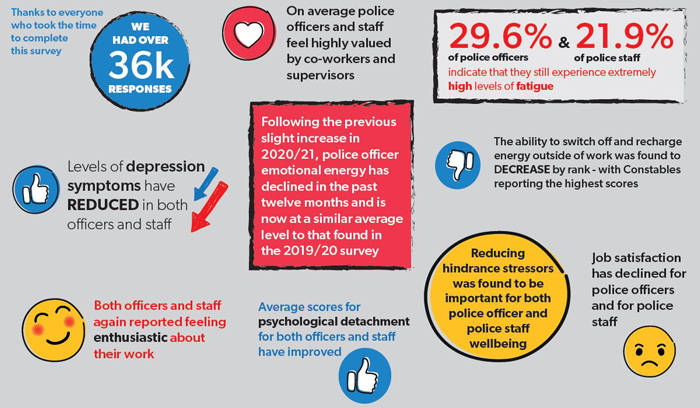Supportive leadership ‘critical’ to officer wellbeing, survey finds
Leadership skills and work-related constraints have been identified as a “high priority” in this year’s national police wellbeing survey.
Supportive leadership was seen as “critical” to individual wellbeing, and attitudes and behaviours among police officers.
The survey saw the highest response yet with 36,633 officers, staff and volunteers taking part – a 60 per cent increase on last year’s number.
Andy Rhodes, service director for the College of Policing’s National Police Wellbeing Service, said the survey highlighted “enduring problems” that need to be addressed, in particular “hindrance stressors” or work-related constraints.
This includes areas such as bureaucratic barriers, administrative difficulties and poorly designed work processes, which were seen as driving many of the areas of concern across policing, such as intention to quit, supportive leadership, workload and job satisfaction.
The survey, conducted by the Policing Research Unit at Durham University in conjunction with the National Police Wellbeing Service, College of Policing and National Police Chiefs’ Council, ran for seven weeks from October to December to give every member of the policing workforce across England and Wales the opportunity to say “how they truly feel at work” to build “a really clear picture” of what needs to be worked on.
Of the respondents, 18,600 (13.2 per cent) were police officers (of all ranks), more than 15,100 (19.8 per cent) were police staff (of all grades), more than 1,400 were police community support officers, with 231 Special Constables and 131 volunteers.
The findings for police officers particularly, confirm that policing continues to be a challenging and stressful occupation. General wellbeing returned to pre-pandemic levels, and job satisfaction and a sense of being valued by the public have declined, according to the survey
However, having a sense of meaningful work remains at a high level, as does the sense of connection to colleagues and overall mental wellbeing.
There was also an increase in a sense of competence, and a decrease in depression.
Leadership skills of frontline police officers and staff were identified as “a key priority” for policing and the findings in the survey demonstrated how critical supportive leadership is to individual wellbeing, and attitudes and behaviours.
The results of the survey will be drawn into the ongoing work within the College of Policing to develop the National Police Leadership Centre, which will have an initial focus on first-line supervisors.
Andy Rhodes, service director for the College of Policing’s National Police Wellbeing Service said: “Some of the findings are challenging and should be seen in the context of a demanding year for policing as we have emerged from the pandemic combined with a series of events which have drawn significant criticism of the service.
“This survey captures the voice of over 36,000 police officers and staff and enables police chiefs, the College of Policing and National Police Wellbeing Service to prioritise the health of their people.
“There are enduring problems that we must take steps to address. In particular the problem of hindrance stressors – this leaps off the page this year which is why it has been identified as a Police Covenant and Her Majesty’s Inspectorate of Constabulary and Fire and Rescue Services (HMICFRS) priority.’’
The Front-Line Review identified organisational stressors as a priority issue and HMICFRS says it will be increasing its focus on hindrance stressors.
Several police forces are integrating this challenge into leadership training while others are exploring how technology can be used to remove unnecessary work. These “positive developments” will be supported through the Police Covenant.
Chief Constable Andy Marsh, College of Policing chief executive officer, said: “On a daily basis police officers and staff are exposed to distressing events which we know has a considerable effect on their mental health and wellbeing. This survey has emphasised the importance of looking after our people so they are able to look after the public.
“Some of the issues identified are not new and we must redouble our efforts to find solutions and make sure police officers and staff are getting the best support and care.
“The new Police Covenant is welcome recognition of the important role that those in policing fulfil to help make communities safer. The College of Policing’s National Police Wellbeing Service, Oscar Kilo, will continue to work with the wider policing family to tackle the problems raised.
“The findings will also inform work to establish the National Police Leadership Centre so we develop people focussed leaders at every rank who recognise how important it is to look after each other.”
Positive survey findings included:
- For both police officers and staff, levels of depression symptoms have reduced in the past 12 months and are at a similar level between the two groups;
- The average score for relatedness (a need to feel a sense of belonging and being part of a team where they feel respected and valued) has increased for both police officers and police staff;
- Work engagement, which relates to individuals feeling enthusiastic about their work and fully investing their emotional, cognitive and physical energies into their job roles, was again reported at a high average level by both police officers and police staff;
- Average scores for feeling valued by co-workers and by supervisors are at a high level for both police officers and police staff, with no significant change since the previous survey;
- Police staff, following an increase during the pandemic period, the average scores for anxiety symptoms have returned to the previous level evident in the 2019/20 survey; and
- Average scores for psychological detachment for both officers and staff have improved.
Findings requiring further work included:
- Following the previous slight increase reported in the 2020/21 results, police officer emotional energy has declined in the past 12 months and is now at a similar average level to that found in the 2019/20 survey;
- Average fatigue levels for police officers increased in the past 12 months – 29.6 per cent of police officers and 21.9 per cent of police staff indicated that they experienced very high levels of fatigue;
- Frequencies of encountering hindrance stressors at work were higher on average for police officers than police staff. For police officers, those at the lower ranks of sergeant and constable had the highest average level of experiencing hindrance stressors (very high average level);
- Average scores for job satisfaction have declined for police officers, with a medium effect size, since the 2020/21 survey; and
- Intention to quit was found to have significantly increased over the past twelve months for both officers and staff.
The National Police Wellbeing Service and College of Policing say the expectation now is that forces will address the key themes locally and pick this up with their staff associations as they continue to develop their local wellbeing offer.
They said: “We will continue to ask for the views of officers, staff and volunteers and work with wellbeing leads in every force to ensure that we have sight of the issues that matter the most.
“We’re working closely with others who are there to provide support, such as the Police Federation, Superintendents’ Association, unions, staff associations and charities to make sure that we can enhance the support on offer.
“The Police Covenant has now been enshrined in law and is already influencing positive improvements in areas such as occupational health standards, recruitment of a chief medical officer for policing, mental health support for new recruits and a much more robust offer to support families and those who retire from the service.”



